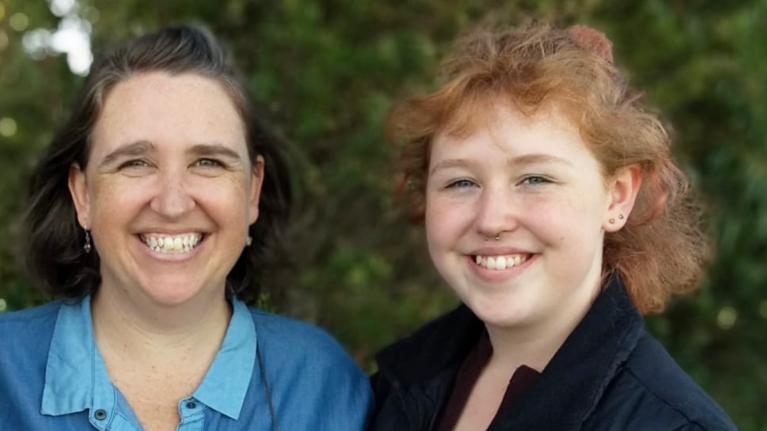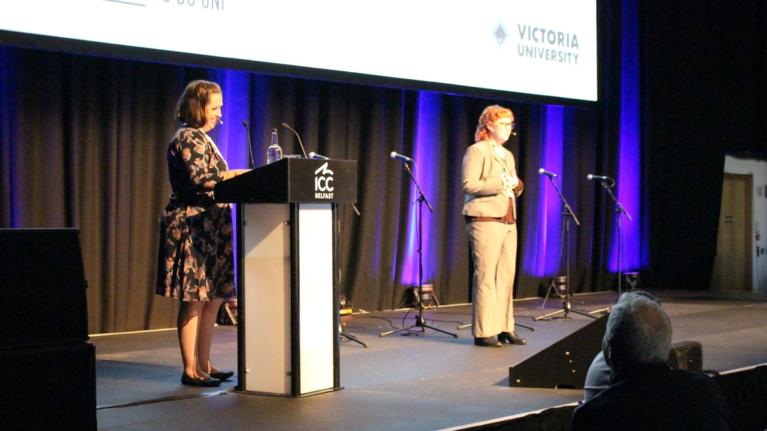Appreciating neurodivergent minds: a Q&A with Jane & Honour Hickey
As awareness of neurodiversity – the differences in human brains – increases, so does the movement to create a more understanding and inclusive world for all types of brains.
People who are neurodivergent – such as those with autism or attention deficit hyperactivity disorder (ADHD) – can experience different challenges to those who are neurotypical, but they also have unique strengths.
Victoria University (VU) youth work lecturer Jane Hickey and her daughter Honour, who is a disability support worker and is neurodivergent, are passionate advocates for celebrating difference and diversity.
Jane and Honour recently gave a keynote presentation on this topic at the Education Authority Conference in Belfast. Here, they share some of their ideas.

The strengths of neurodivergent minds
Tell us about your recent keynote presentation, ‘Learning to understand and appreciate neurodivergent minds.’ What does this topic mean to you?
Jane and Honour: Autism continues to be viewed within a deficit framework in the broader community, with harmful stereotypes perpetuated in the media.
We both align with the neurodivergent movement that considers autism as a natural variance or difference in the diversity of brains that exist in our community.
Therefore, there is no ‘problem’ that exists within the individual. The ‘problem’ exists within an inaccessible world that excludes and creates barriers for autistic young people.
What are some key messages you want everyone to know about neurodivergent thinking?
Jane and Honour: We believe that given the right environments, every individual has the ability to grow, develop and flourish.
Neurodivergent thinking can be creative, provide important and alternative perspectives that neurotypical minds often miss, and should be celebrated.
As a wider community, we need to learn how to listen more closely to neurodivergent voices and ensure that everyone has decision-making authority over their own lives.

Related
Neurodiversity & inclusion at VU
How do you think better understanding of neurodivergent thinking could benefit VU students, staff and the wider community?
Jane: When we use universal design for learning, we are actively working to ensure that the learning needs of all students are being catered for. This includes our neurodivergent students.
Celebrating difference and diversity in the classroom models inclusive practice for our students, fellow staff and the broader community.
What opportunities do you think new VU partnerships like Autism Spectrum Australia (Aspect) will bring to VU and the community?
Jane: This partnership will provide an opportunity to lead the community in making sustainable social change and addressing the many barriers that autistic individuals are faced with on a daily basis.
Making a difference in youth & disability work
You’re both professionals in the youth and disability support space. Tell us about your work and what you love about it?
Jane: As a youth work academic within the College of Arts and Education at VU, one of my favourite parts of my job is facilitating a classroom discussion and seeing students have lightbulb moments and become advocates for change, challenging abelism in their own communities.
A highlight of my year is watching students walk across the stage at graduation after working alongside them over three or four years.
Honour: I am a disability support worker in Melbourne’s western suburbs. I love my job because of the young people that I work with.
I have been a disability support worker for over a year now and have been grateful for the opportunity to learn more about disability and how to work and communicate effectively with all of the young people that I support.
Jane, you’re also a VU alumni. How do you feel that studying at VU helped contribute to your career development?
Jane: I am a proud VU alumni. I have worked in the youth and community sector and am thankful for my Bachelor’s degree, which gave me a strong, ethical framework for my practice.
I began my studies in vocational education and followed a pathway into a Bachelor’s degree, then onto a Master’s degree and I am now completing my PhD thesis.
VU is the university of opportunity, and I was given the chance to return firstly to TAFE and then moved across to higher education to teach within the Youth and Community program.
A note from Jane and Honour on inclusive language:
We use identity-first language when referring to autistic individuals, as this is the preference of the majority of individuals in the community.
However, we recognise that there continues to be diversity of thought, with some choosing to be referred to using person-first language (as a person with autism, or a person on the spectrum). Always find out from the individual how they wish to use this language.
VU & Autism Spectrum Australia (Aspect)
VU is proud to partner with Autism Spectrum Australia (Aspect), Australia’s largest provider of autism-specific services and school programs.
Located at St Albans campus, the new Aspect service hub will offer students in areas like social work, community services and speech pathology opportunities for placements, internships and employment.